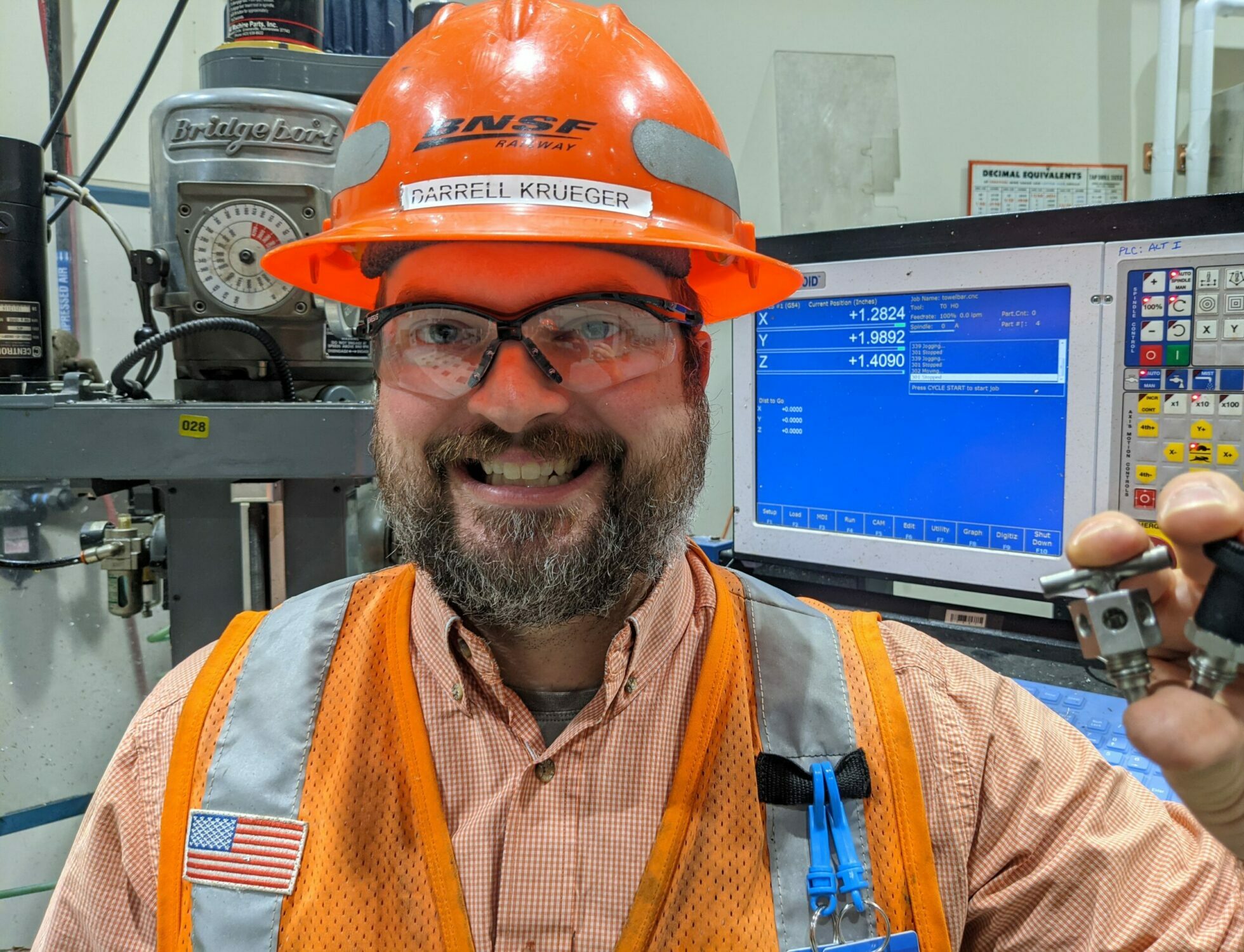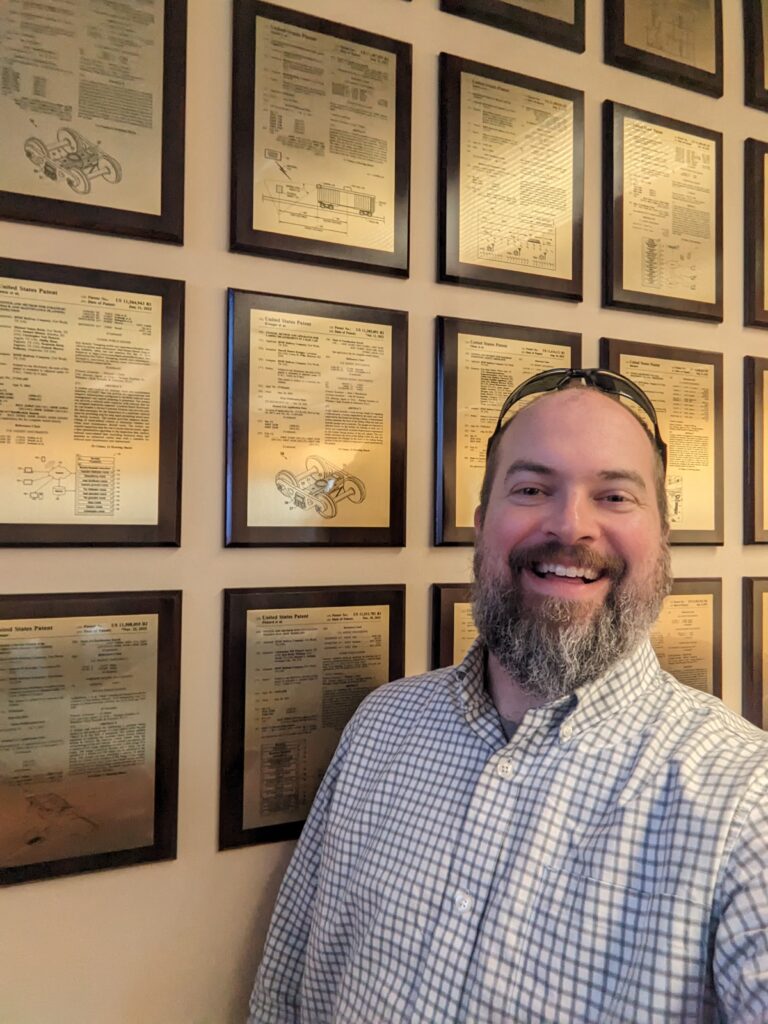
experience
At BNSF Railway, Krueger leads a team to develop, test, and evaluate new systems and technologies to improve railroad safety and efficiency. He also investigates derailments and serves on technical committees within BNSF and the railroad industry at large. Krueger earned a bachelor’s degree and a master’s degree in mechanical engineering from Auburn University.
How did engineering become a passion of yours?
Great question. I think I’ve always been curious about how something works. My parents and extended family fostered this curiosity with trips to the library, Legos, Lincoln Logs, and other hands-on toys as a kid. My mom worked for the phone company, my dad fixed clocks as a side job, and my uncle was a pilot, so there was always something to see beyond the toys.
My uncle was educated as an electrical engineer but he went straight into the Vietnam War as a fighter pilot in the Air Force. He always had some kind of electronic gadget or computer to explore. Over the years, I tinkered with basic electronics, and eventually, I modified my truck for off–road trail riding. But it wasn’t until college that I truly came to appreciate engineering as a whole.
I entered college as a civil engineering major, knowing I wanted to be an engineer but had no idea what discipline. As freshmen, we were required to take an “Intro to Engineering” class. We had one lecture hour a week and another hour to meet with a student adviser. I met my student adviser at one of the lab buildings, where I saw students working on race cars, and was completely floored. “How do I do that?!” I asked. I give all the credit in the world to my student advisor, Jacque Cole, for introducing me to Baja SAE (BSAE), a competition that challenges engineering students to design and build an off-road vehicle. Had I not met her, I would have not joined the team as soon as I did.
My time with BSAE is what shaped my passion for engineering. As a freshman, I began to learn from senior students, and as we designed and built our car, it really made the lectures stick. I learned a lot about schedules, budgets, teamwork, and what really needs a keen eye and tight tolerances. I honestly think that if I didn’t have an outlet like BSAE, I would have likely dropped out of engineering.
How is SAE helping to shape the future of engineering and why is it to important to you?
When I look back on my time in school, I see what a blessing it was to have a program like BSAE. BSAE is a practical outlet for students to get hands-on experience ahead of their first job out of school. I was able to really practice heat transfer, machine design, mechanics of materials, FEA, CAD, FMEA, testing and instrumentation, budgets, and, most importantly, engineering leadership and teamwork. This experience prepared me well.
Now, I am a technical inspector for the Baja SAE series. We inspect cars for compliance with the rules and guide students on what fixes are appropriate. While there are some tense times as a “referee,” it’s a good reminder of two things: 1) how to have civil, constructive conflict and 2) how important it is for students to get experience interfacing with their regulator. In the BSAE world, the regulator is the BSAE NTI team. In the working world, students will have to interface with the FAA, FCC, FRA, DOT, OSHA, PHMSA, FDA, and a whole host of other regulatory agencies governing their work.
I volunteer for SAE to give back to a program that did so much for me, and I hope to provide a positive, memorable experience for students.

Talk a little bit about what you currently do and your role at BNSF Railway.
I am an assistant director in the technical research and development department of BNSF Railway. We are a group of about 17 technicians, scientists, and engineers who solve problems for the railroad. We investigate derailments and other incidents, and we have a chemistry lab dedicated to all fuels, paints, and chemicals used on the railroad. We have a metallurgy group that investigates material failures and performs quality control on the vast amounts of material we purchase. We have a vehicle dynamics group that analyzes train operations over certain routes looking at fuel economy, transit time, etc. And we have a group dedicated to physical tests, doing fatigue and ultimate–load testing. I technically work in that group, but we also do technology development, where we look at applying new technologies to the right places on the railroad.
Like BSAE, the railroad is an unforgiving environment, and not everything you buy works out. When the market cannot supply a suitable system for our needs, we design and build it ourselves. A recent success of ours was a machine vision system that takes incredibly detailed images of the track at up to 70 mph. These images are fed into machine vision models, which detect various problems, such as missing bolts or cracked components. Learn more about this project here: https://www.rtands.com/track-construction/getting-a-better-look-at-bnsfs-track/.
What advice would you give to those young engineers (especially mechanical engineers) who are considering becoming professionally licensed?
Having a PE doesn’t necessarily mean you stamp drawings all day and review other people’s work. Yes, that’s part of the roles and responsibilities of a PE but not the sole reason for becoming one. Obtaining your PE is hard work, but it is a statement to others that you have mastered your area of expertise, are bound to a set of ethical standards, and are committed to personal development and lifelong learning. A PE will open doors and opportunities not available to others, but you have to prioritize staying in a job long enough to work under a PE who will recommend your licensure.
What are the biggest challenges and opportunities for young engineers in the future?
Wow this is a big but great question. Let me break this down in four areas:
- The social toll of the pandemic: I believe the pandemic took a huge social toll on society, especially young people. In recent years, I’ve interviewed several engineering students for our internship program and am saddened to hear how their college and early–career experiences were affected. I think the pandemic has had a negative effect on communication and collaboration. With everyone sent back to their dorms or home offices, we’ve lost a bit of those skills. I would encourage young engineers to get out to local SAE events and meetings, make presentations, and try to attend more conferences to bolster interpersonal skills.
- Be careful with AI: The explosion of artificial intelligence (AI) over the last few years has been fascinating and terrifying at the same time. I would caution young engineers on how much they rely on AI, even for writing reports. If you can’t write about something yourself, do you even understand it? Lately, we’ve even seen evidence of ChatGPT sneaking into scholarly articles. As engineers, we musttake the time to master our material and explain our rationale. We have a saying here at work, “I’m not from Missouri, but you gotta show me!”
- Double duty: Nearly every engineer I know has some secondary specialty beyond their traditional education. I would encourage young engineers to develop a secondary discipline that is complementary to their role. The lines of engineering are now blurred, and we need to be able to operate outside our silos. Personally, I am a mechanical engineer with a heavy emphasis on mechanisms and machine design, but I also have a lot of experience with optics, computer programming, microcontrollers, and RF systems. By having this extra area of special interest, you are better prepared to pivot should a new opportunity come along.
- Engineering history: The history of engineering and technology is paved with so many good stories, not just of individual engineers but of the teams and projectsthey accomplished. By reading up on engineering history, we gain an appreciation for those whose shoulders we stand on, and we can learn modern lessons from their historical trials. Some suggested titles include: The Idea Factory by Jon Gertner, Sidewinder: Creative Missile Development at China Lakeby Ron Westrum, and The Never–Ending Challenge of Engineering: Admiral H.G. Rickover in His Own Words by Hyman George Rickover (compiled by Paul E. Cantonwine).

